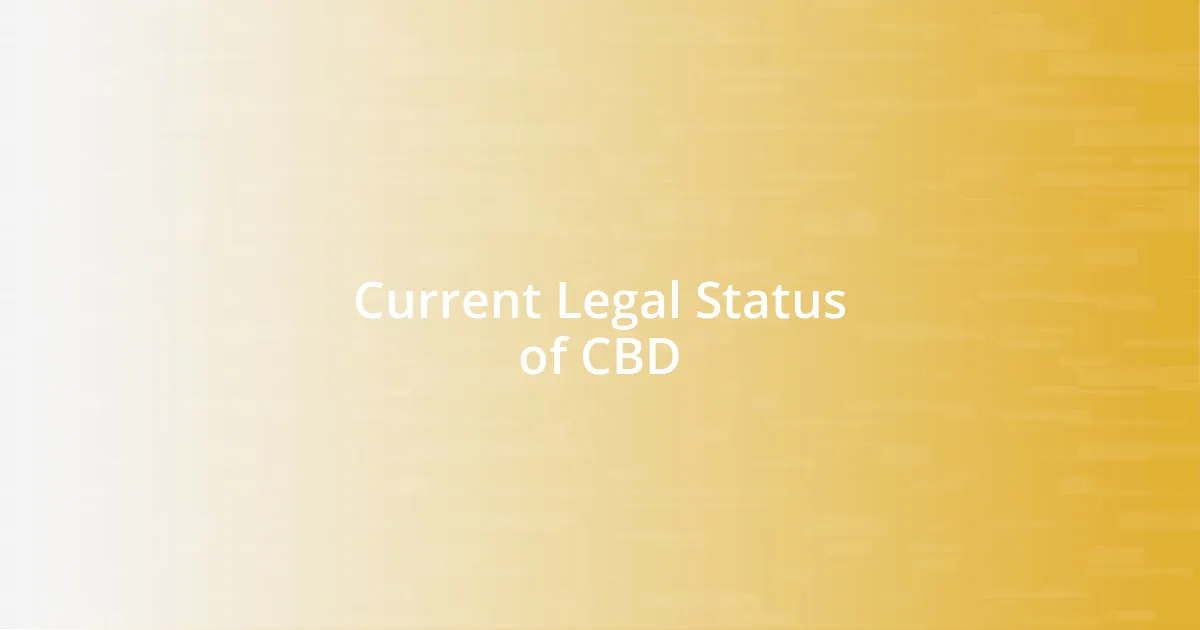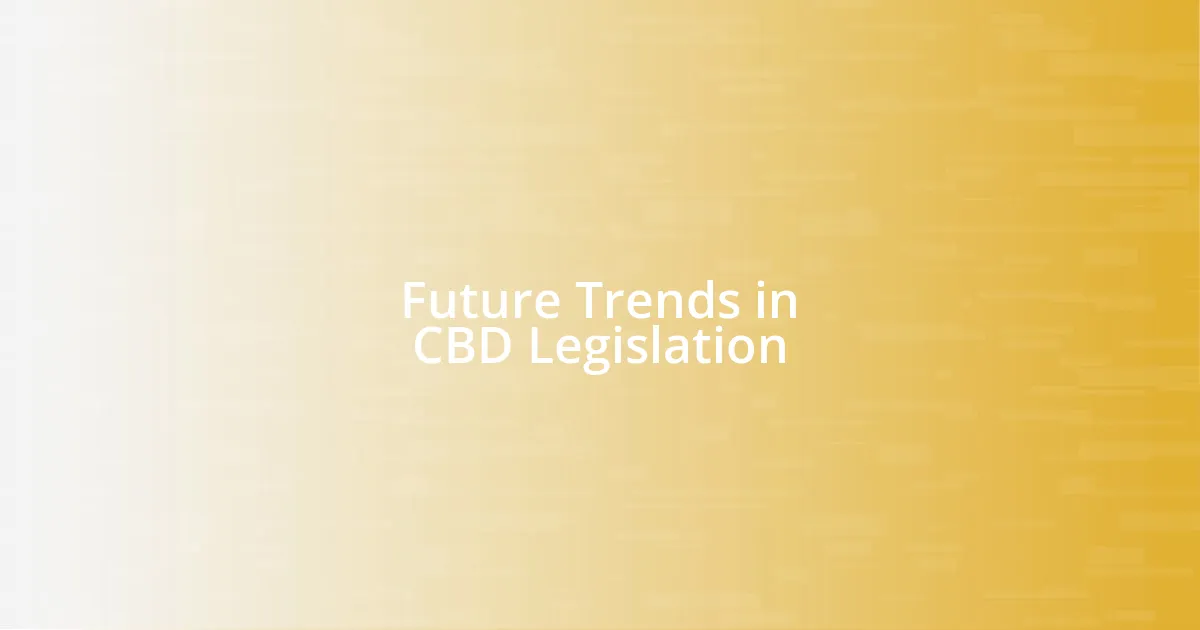Key takeaways:
- CBD products in the UK must contain less than 0.2% THC, ensuring safety and legality for consumers.
- The UK legalized CBD products in 2018, following the recognition of their therapeutic potential, with ongoing regulatory guidance from the FSA.
- Public perceptions of CBD are shifting positively, highlighting its benefits for stress relief, pain management, and potential mental health applications.
- Future trends suggest a move towards more comprehensive regulations and integration of CBD into mainstream healthcare practices.

Overview of CBD in UK
CBD, or cannabidiol, has captured the attention of many in the UK for its potential therapeutic benefits, leaving both advocates and skeptics intrigued. Personally, I’ve seen friends find relief with CBD oil after struggling with anxiety, which makes one wonder—could this simple extract hold the key to better mental health for many?
In the UK, CBD products must contain less than 0.2% THC, the psychoactive compound found in cannabis. This regulation aims to ensure that consumers can enjoy CBD without the mind-altering effects commonly associated with marijuana. I remember attending a local market where a vendor happily explained this requirement, which reassured me about the safety and legality of the products available.
The CBD market in the UK is booming, reflecting a growing acceptance of alternative wellness solutions. It’s fascinating to see how societal attitudes have shifted; just a few years ago, discussing CBD felt daring! Have you ever experienced a similar shifting perspective on a controversial topic? It’s comforting to know that as more research emerges, the conversation may continue to evolve, leading to a broader understanding of CBD’s potential in our daily lives.

History of CBD Legalization
The journey of CBD legalization in the UK has been multifaceted and, at times, complex. Initially, the UK had strict regulations regarding cannabis, treating it as a dangerous substance. However, the tide began to turn in 2016 when the government recognized the therapeutic potential of cannabis extracts, including CBD. I remember feeling a shift in the air; it was as if a door was slowly opening for new possibilities in natural health.
- In 2018, the UK legalized CBD products derived from industrial hemp and defined regulations focused on safety and low THC levels.
- The World Health Organization (WHO) released a report in 2018, deeming CBD safe and non-addictive, bolstering public perception.
- In 2020, the UK Food Standards Agency (FSA) implemented guidelines for CBD products, indicating a movement towards regulated market practices.
Reflecting on this evolution, I can’t help but think of the many conversations I’ve had with those skeptical of CBD. Their sentiments are often rooted in fear of the unknown, which makes it even more gratifying to witness the transformation in attitudes and regulations. It’s reassuring to see how far we’ve come together, paving the way for clearer understanding and access to these beneficial products.

Current Legal Status of CBD
The legal status of CBD in the UK remains tightly regulated, primarily to ensure consumer safety. I was surprised to discover that while CBD is legal, any product containing THC above the 0.2% threshold is still treated as a controlled substance. This can sometimes lead to confusion, especially when talking to friends who are eager to try CBD but are unsure about the rules. It’s important to educate ourselves and others to avoid unintentional legal issues.
Interestingly, the market is flooded with various CBD products, from oils to gummies, but they must comply with stringent regulations by the UK Food Standards Agency (FSA). I personally had a friend who purchased a CBD-infused cream that made impressive claims but didn’t meet safety standards. This experience serves as a reminder that consumers must be diligent and ensure they buy from reputable sources. Missteps can compromise not only legality but health as well.
Navigating the legal landscape of CBD in the UK can feel a bit like walking through a maze. As I explored more about this topic, I found that some products are even subject to novel food regulations, which require additional safety assessments. This connected with my understanding of how critical it is to balance innovation with consumer protection. Have you ever felt overwhelmed by new regulations that seemed to emerge overnight? I certainly have, but knowing that such measures are designed to safeguard us helps ease my apprehension.
| Aspect | Details |
|---|---|
| Legal Status | CBD is legal in the UK if it contains less than 0.2% THC |
| Regulating Body | UK Food Standards Agency (FSA) oversees safety guidelines |
| Product Types | Includes oils, edibles, and skincare products |
| Recent Developments | Novel food regulations for CBD require safety assessments |

Benefits of CBD Use
The benefits of CBD use are becoming increasingly hard to ignore. Many people, including myself, have witnessed its positive impact on stress management. I remember the first night I tried a CBD oil after a particularly overwhelming day. It felt like a comforting blanket had wrapped around me, allowing me to unwind and finally catch up on some much-needed sleep. That personal relief is mirrored in what many others report: enhanced relaxation and improved sleep patterns.
Beyond stress relief, CBD has also shown promise in pain management. I had a relative who struggled with chronic joint pain, and after consulting her doctor, she decided to give CBD cream a try. The change was remarkable—she shared with me how it was easier for her to move around, and simply enjoy her day-to-day activities without the constant nagging pain. This anecdote reinforces what research suggests: that CBD may help reduce inflammation and alleviate pain, offering a natural alternative to conventional pain relievers.
Moreover, I find it intriguing that CBD is also being explored for its potential benefits in mental health. There’s a lot of buzz about its anxiolytic (anxiety-reducing) properties. Reflecting on my own experiences, I can attest to moments when just a small dose of CBD helped calm racing thoughts during a stressful week. It makes me wonder, could this be a valuable tool for those grappling with anxiety? The growing body of research certainly seems to suggest so, highlighting the need to consider CBD as part of broader mental health strategies.

Concerns and Misconceptions
Concerns and misconceptions about CBD often stem from a lack of understanding. For instance, many people still confuse CBD with THC, assuming that all cannabis products can cause a “high.” I remember chatting with a colleague who was baffled that CBD could be legal while cannabis was not. Explaining the difference between the two compounds helped clarify that CBD offers the therapeutic benefits without the psychoactive effects of THC.
Another significant concern revolves around safety and quality. I once tried a CBD brand that was highly praised, but I later discovered that it didn’t have third-party lab testing to ensure purity. This experience made me realize the importance of transparency in the industry. You might wonder, how can we trust what we’re buying? My advice is to always look for reputable brands that provide certification to back up their claims.
Lastly, I often hear skepticism regarding the effectiveness of CBD, with some believing it’s just a trendy placebo. I’ve had friends express doubt, stating they don’t feel any difference after using CBD, which led me to ponder whether expectations play a role in perceived effectiveness. I think if we approach it with an open mind while also managing our expectations, we might just unlock its true potential. Have you considered how your beliefs might shape your experience with CBD? It’s certainly something worth reflecting upon.

Future Trends in CBD Legislation
As I look ahead, I believe we’ll see a significant shift towards more comprehensive regulations surrounding CBD. Just the other day, I was discussing CBD with a friend who works in policy-making, and he mentioned that governments are starting to recognize the economic potential of a well-regulated CBD market. Could this lead to clearer guidelines on product safety and quality? I think it’s a high possibility, and it excites me to think about how this could reduce consumer confusion.
Another trend I foresee is the integration of CBD into mainstream wellness and healthcare. Reflecting on my own experiences, I’ve noticed how often I hear about CBD being suggested in holistic health circles. Imagine a future where doctors routinely discuss CBD as part of treatment plans for managing stress or pain. This growing acceptance might not only legitimize CBD but also empower individuals to make informed choices.
Lastly, the global landscape of CBD legislation is constantly evolving. I’ve been following various countries’ approaches to CBD, and it’s fascinating how some are embracing it while others remain cautious. Could international collaboration on CBD regulations become a reality? I feel that as research progresses and more positive stories emerge, we might witness countries learning from each other’s successes, leading to a more unified global stance on CBD.













